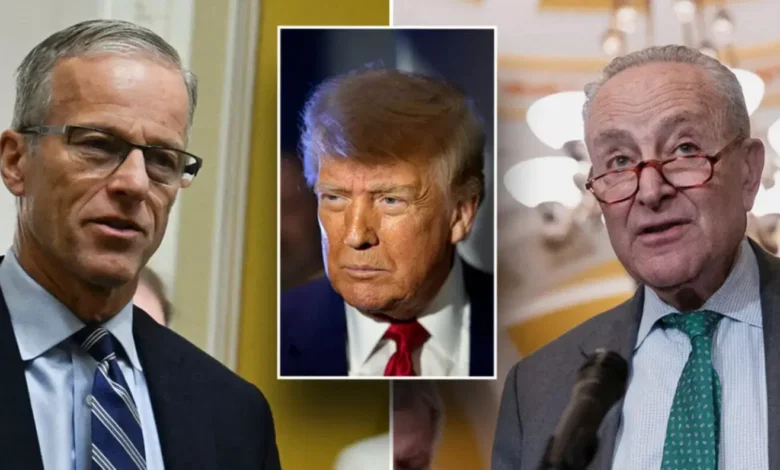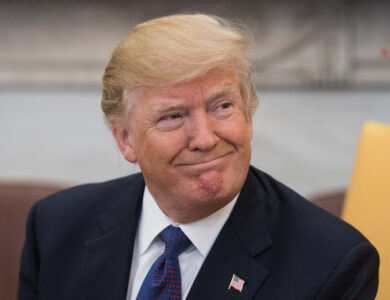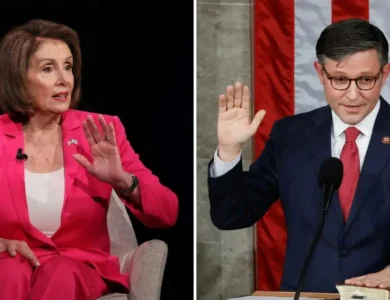Thune Poised to Trigger ‘Nuclear Option’ to Speed Up Trump Confirmations

Senate Majority Leader John Thune (R-SD) is preparing to use the “nuclear option” to clear a logjam of Trump nominees due to unprecedented Democratic Party obstruction in the Senate.
Thune is setting the stage to use the parliamentary maneuver in order to lower the filibuster threshold for confirming large batches of lower-level presidential nominees, marking the latest use of the so-called “nuclear option” in the upper chamber’s history.
Now, Thune is expected to apply the tactic to expedite confirmation of dozens of Trump administration nominees for subcabinet and lower-level positions. Judges and cabinet secretaries would not be included.
Thune’s plan relies on the Senate’s rules of debate and the chamber’s unique procedures. On Tuesday night, he introduced a resolution to accelerate the approval of about 40 nominees grouped together. By rule, the Senate must first vote on whether to break a filibuster on that resolution. That procedural vote requires 60 yeas.
Democrats are expected to block it, leaving the tally short of the threshold. But a failed vote is precisely what Thune is aiming for.
Under Senate rules, only a senator who voted on the winning side of a roll call can request that the chamber reconsider the vote. After the filibuster vote fails, Thune will likely switch his own vote from yes to no, putting himself on the prevailing side. That procedural move allows him to call for a revote.
Because Senate debate is cut off following a failed cloture attempt, Democrats would be unable to delay or obstruct Thune’s next steps.
At that point, Thune is expected to raise a point of order that cloture on his type of resolution requires only a simple majority, not 60 votes. The presiding officer — either Senate President Pro Tempore Chuck Grassley (R-IA) or Vice President J.D. Vance in his role as Senate president — will rule against Thune, affirming existing precedent.
Thune will then appeal the ruling. That appeal requires only a simple majority to succeed. If at least 51 senators vote to overturn the chair, a new Senate precedent will be established. From that point forward, similar resolutions grouping together lower-level nominees would require just 51 votes to advance.
If the gambit succeeds, Thune would need to schedule another cloture vote under the newly established precedent. That vote could take place as soon as Monday, Sept. 15. It would clear the way for final approval of the slate of nominees in one vote on Wednesday, Sept. 17.
Supporters of the move say it would streamline the Senate’s ability to process a backlog of nominees by cutting down on hours of debate for positions that historically face little opposition.
Critics argue that each use of the nuclear option erodes the Senate’s tradition of extended debate and consensus-building, weakening minority party rights and further polarizing the chamber.
The maneuver reflects a familiar playbook in recent Senate history. Reid’s Democrats used the nuclear option to speed up the confirmation of President Barack Obama’s executive branch picks after repeated Republican blockades. McConnell’s Republicans later deployed it to ensure President Trump’s Supreme Court nominees faced only majority thresholds.
The Senate has long considered the filibuster to be the “coin of the realm,” allowing unlimited debate unless a supermajority agrees to end it. Each time that barrier has been lowered through the nuclear option, it has fundamentally altered the way the chamber conducts business.
Thune’s move would follow in the footsteps of the late Harry Reid (D-NV) and former Mitch McConnell (R-KY), who each used similar tactics to chip away at the filibuster over the past decade. Reid led the first change in 2013, lowering the 60-vote requirement to a simple majority for executive branch nominees other than Supreme Court justices. McConnell followed in 2017, extending that precedent to cover Supreme Court confirmations, beginning with Justice Neil Gorsuch.
Later this week, the Senate will find out if Thune is able to add another chapter to that history.





